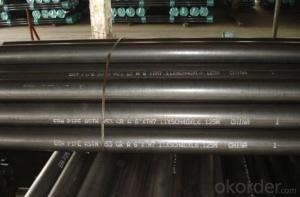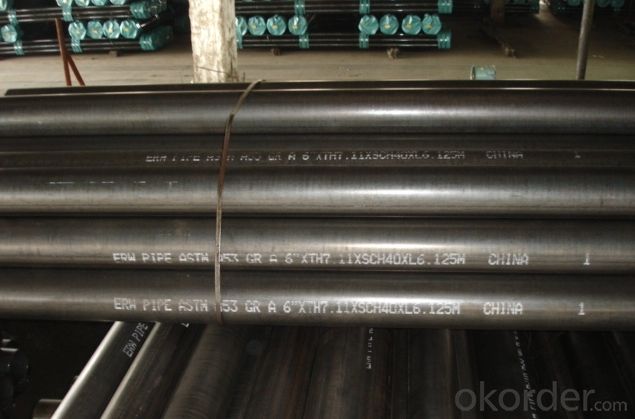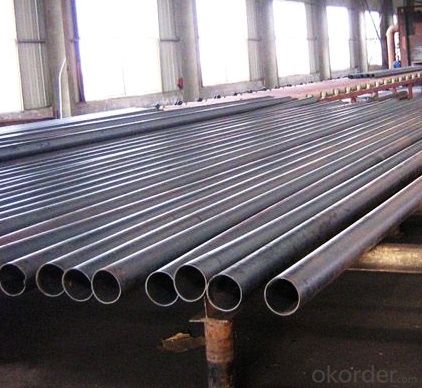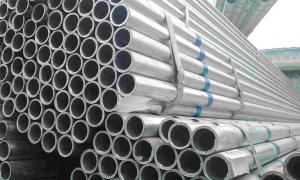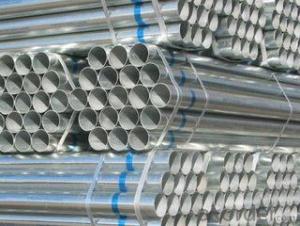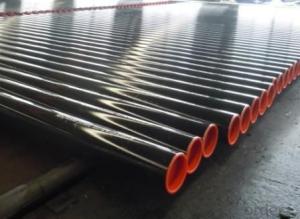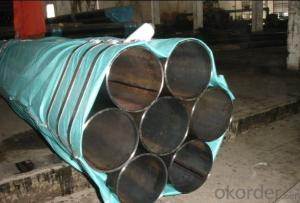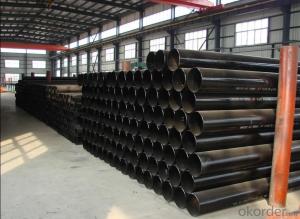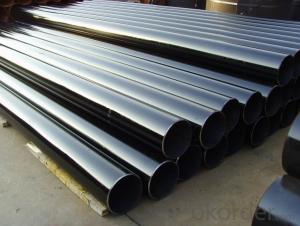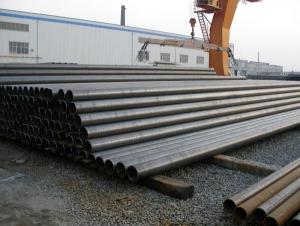Steel Pipe ERW API 5L
- Loading Port:
- China Main Port
- Payment Terms:
- TT or LC
- Min Order Qty:
- 25 m.t.
- Supply Capability:
- 9000 m.t./month
OKorder Service Pledge
OKorder Financial Service
You Might Also Like
1、Structure of Steel Pipe ERW API 5L:
ERW Steel Pipe is formed by drawing a solid billet over a piercing rod to create the hollow shell. As the manufacturing process does not include any welding, pipes are perceived to be stronger and more reliable. Historically seamless pipe was regarded as withstanding pressure better than other types, and was often more easily available than welded pipe.
2、Main Features of Steel Pipe ERW API 5L:
• High manufacturing accuracy
• More Higher strength
• Small inertia resistance
• Strong heat dissipation ability
• Good visual effect
3、Steel Pipe ERW API 5L Specification:
Standard | GB, DIN, ASTM ASTM A106-2006, ASTM A53-2007 |
Grade | 10#-45#, 16Mn 10#, 20#, 45#, 16Mn |
Thickness | 8 - 33 mm |
Section Shape | Round |
Outer Diameter | 133 - 219 mm |
Place of Origin | Shandong, China (Mainland) |
Secondary Or Not | Non-secondary |
Application | Hydraulic Pipe |
Technique | Cold Drawn |
Certification | API |
Surface Treatment | factory state or painted black |
Special Pipe | API Pipe |
Alloy Or Not | Non-alloy |
Length | 5-12M |
Outer Diameter | 21.3-610mm |
Grade | 20#, 45#, Q345, API J55, API K55, API L80, API N80, API P110, A53B |
Standard | ASME, ASTM |
1) Material:20#(ASTM A 106/A53 GRB.API5LGRB,GB),45#,16Mn,10#.
2) Specification range:OD:21.3-610mm,WT:6-70mm,length:6-12m or according to the requirement of clients.
3) Excutive standards:GB,ASME API5L.ASTM A 106/A53,Despite of the above standards,we can also supply seamless steel pipe with standard of DIN,JIS,and so on,and also develop new products according to the requirements of our clients!
4) Surface:black lacquered,varnish coating or galvanized.
5) Ends:Beveled or square cut,plastic capped,painted.
6) Packing:bundles wrapped with strong steel strip,seaworthy packing.
4、Packaging & Delivery
Packaging Details: | seaworthy package,bundles wrapped with strong steel strip |
Delivery Detail: | 15-30days after received 30%TT |
5、FAQ of Steel Pipe ERW API 5L:
①How is the quality of your products?
Our products are manufactured strictly according to national and internaional standard, and we take a test
on every pipe before delivered out. If you want see our quality certifications and all kinds of testing report, please just ask us for it.
Guaranteed: If products’ quality don’t accord to discription as we give or the promise before you place order, we promise 100% refund.
②How about price?
Yes, we are factory and be able to give you lowest price below market one, and we have a policy that “ for saving time and absolutely honest business attitude, we quote as lowest as possible for any customer, and discount can be given according to quantity”,if you like bargain and factory price is not low enough as you think, just don’t waste your time.Please trust the quotation we would give you, it is professional one.
③Why should you chose us?
Chose happens because of quality, then price, We can give you both.Additionally, we can also offer professional products inquiry, products knowledge train(for agents), smooth goods delivery,SGS test is available, customer inspection before shipping is welcome, third party inspection is no problem. We are trying to provide you best service and best quotation.
6、Steel Pipe ERW API 5L Images:
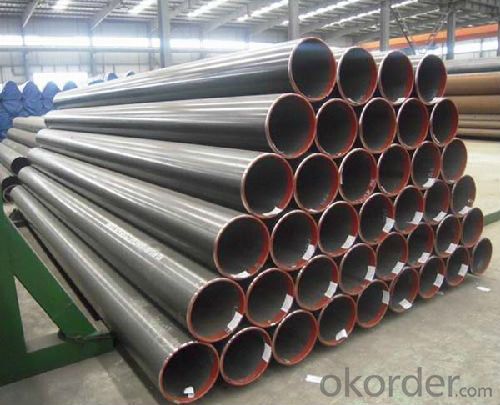
- Q: What is the outer diameter and wall thickness of the welded steel pipe of national standard DN250?
- DN250 is the nominal diameter, the outer diameter of the steel pipe is 273mm, the thickness is above 6.5mm.
- Q: What is the typical diameter range for steel pipes?
- The typical diameter range for steel pipes can vary depending on the specific application and industry requirements. However, in general, steel pipes can have diameters ranging from as small as 0.5 inches (12.7 millimeters) up to several feet (over a meter) in diameter. The most commonly used steel pipes for various purposes, such as plumbing, construction, and transportation of fluids or gases, typically fall within the range of 1/2 inch (13 millimeters) to 36 inches (914 millimeters) in diameter. It is important to note that larger diameter steel pipes are often used for industrial applications, such as oil and gas pipelines, while smaller diameter pipes are commonly used for residential and commercial plumbing systems.
- Q: Is hot dipped plastic pipe steel?
- The characteristics of hot dipped plastic pipe are:1., hot dipped plastic pipe superior anti-static performance: through the formula to add antistatic agent, so that its internal and external surface resistance value reached and exceeded the national industry standards.2., such as the use of plastic raw materials, add flame retardants. The flame retardant performance index conforms to the national standard, and the steel plastic composite structure has better flame retardance than the pure plastic pipe material, and is suitable for underground inflammable, explosive and other places.3. hot dip coating steel strong adhesion: steel surface after special treatment, curing, coating adhesion is greater than or equal to 30N/10mm.4., dense internal and external resin layer: coating thickness of more than 0.5 mm, no pinholes, with excellent corrosion resistance.The mechanical properties of plastic steel pipe superior 5. hot dip: can withstand the harsh conditions of use: coating steel has good toughness, high mechanical strength, impact bending and other foreign influence, has a strong bearing capacity, has better performance than other mine plastic pipes.6. hot dip steel corrosion and fouling, the fluid resistance is small: corrosion and fouling, especially suitable for the underground conveying high sulfur water and transport of calcium and magnesium plasma water, save the maintenance cost, service life is much higher than that of the other pipe, high economic benefit.7. self lubrication: smooth wall, no fouling, small transmission resistance, under the same conditions, can improve the transport capacity of 30%.8. convenient and reliable connectionThe utility model completely overcomes the defects of the difficult connection of the pure plastic mining materials, and can be connected with the underground steel pipe and the valve by using flanges, fast couplings, etc., and has strong interchangeability.
- Q: Can steel pipes be used for the construction of transmission towers?
- Yes, steel pipes can be used for the construction of transmission towers. Steel pipes are commonly used in the construction industry due to their strength, durability, and ability to withstand various weather conditions. They provide a reliable and cost-effective solution for supporting the weight and load of transmission towers, making them suitable for this purpose.
- Q: What is the role of steel pipes in the transportation of petroleum products?
- Steel pipes have a crucial function in the transportation of petroleum products, as they are specifically designed to endure the high pressure and extreme temperatures associated with oil and gas transportation. A primary responsibility of steel pipes in this process is to serve as a dependable and secure conduit for transporting petroleum products over long distances. They are utilized to construct pipelines that span hundreds or even thousands of miles, connecting oil fields, refineries, and distribution centers. Steel pipes are the preferred choice for this purpose because of their strength, durability, and resistance to corrosion. The high tensile strength of steel allows these pipes to withstand the immense pressure exerted by petroleum products as they flow through the pipelines. Additionally, steel pipes can endure extreme temperatures, ensuring the safe transportation of hot crude oil or refined petroleum products. Moreover, steel pipes possess a high resistance to corrosion, which is of utmost importance given the corrosive nature of petroleum products. To further enhance their corrosion resistance, the pipes are often coated with protective materials such as epoxy or polyethylene. This coating helps prevent leaks or ruptures that could cause environmental damage or safety hazards. Steel pipes also offer cost-effective and efficient transportation of petroleum products. They have a smooth interior surface, which reduces friction and allows for a more efficient flow of oil or gas. This, in turn, helps minimize energy consumption and maximize the throughput of the pipeline system. In conclusion, the main role of steel pipes in the transportation of petroleum products is to provide a reliable, secure, and efficient means of transporting oil and gas over long distances. They are designed to withstand high pressure, extreme temperatures, and corrosion, ensuring the safe and efficient delivery of petroleum products from production sites to refineries and distribution centers.
- Q: What are the safety measures to consider when working with steel pipes?
- When working with steel pipes, it is important to follow specific safety measures to ensure a safe working environment. Some key safety measures to consider include wearing appropriate personal protective equipment (PPE) such as gloves, safety glasses, and steel-toed boots to protect against potential injuries. Additionally, workers should be cautious of sharp edges and use tools designed for cutting and handling steel pipes. It is crucial to secure pipes properly to prevent accidents caused by falling or rolling pipes. Lastly, workers should be trained on proper lifting techniques to avoid strain or injury when handling heavy steel pipes.
- Q: What are the factors to consider when selecting the right steel pipe for a specific application?
- There are several factors to consider when choosing the appropriate steel pipe for a particular application. These factors encompass: 1. Compatibility with materials: Ensuring that the steel pipe is compatible with the substance it will transport or contain is crucial. Different materials may necessitate specific types of steel pipes to prevent corrosion or contamination. 2. Pressure and temperature requirements: The pressure and temperature conditions that the steel pipe will face should be taken into account. This will determine the necessary thickness and strength of the pipe to ensure it can withstand the intended operating conditions. 3. Size and dimensions: Selecting the size and dimensions of the steel pipe should be based on the flow rate, volume, and available installation space. It is vital to choose a pipe with the appropriate diameter and wall thickness to prevent flow restrictions or leaks. 4. Environmental conditions: The environment in which the steel pipe will be installed must be considered. Factors such as exposure to moisture, chemicals, or extreme temperatures may necessitate the use of specific coatings or materials to enhance the longevity and durability of the pipe. 5. Cost considerations: The cost of the steel pipe and its installation should be taken into account. Striking a balance between desired quality and available budget is essential to ensure the most cost-effective solution. 6. Regulatory compliance: Depending on the application, there may be specific industry regulations or standards that must be adhered to. Choosing a steel pipe that meets these requirements is important to ensure compliance and avoid any legal or safety issues. 7. Maintenance and lifespan: The maintenance requirements and expected lifespan of the steel pipe should also be considered. Some applications may require regular inspections or replacements, while others may require a more durable and long-lasting pipe. By carefully considering these factors, it is possible to select the appropriate steel pipe for a specific application that meets the desired performance, durability, and safety requirements.
- Q: What are the advantages of using steel pipes in marine applications?
- There are several advantages of using steel pipes in marine applications. Firstly, steel pipes are highly durable and have a high resistance to corrosion. This is crucial in marine environments where pipes are constantly exposed to saltwater, which can cause rapid deterioration of materials. Steel pipes are able to withstand the harsh conditions and maintain their structural integrity for extended periods of time. Another advantage of using steel pipes in marine applications is their strength. Steel is a strong and robust material that can withstand the high pressure and extreme conditions often encountered in marine operations. This makes steel pipes ideal for transporting fluids, such as water, oil, and gas, in marine environments. Additionally, steel pipes offer excellent fire resistance. In the event of a fire on a ship or offshore platform, steel pipes can provide a reliable fire barrier, preventing the spread of flames and ensuring the safety of personnel and equipment. Furthermore, steel pipes are highly versatile and can be easily fabricated to meet specific requirements. They can be manufactured in various sizes, shapes, and thicknesses, allowing for customization to fit the specific needs of marine applications. Steel pipes can also be easily welded together, providing a seamless and leak-proof system. Lastly, steel pipes are cost-effective in the long run. Although the initial investment may be higher compared to other materials, the durability and longevity of steel pipes make them a cost-efficient choice. With minimal maintenance and a long lifespan, steel pipes reduce the need for frequent replacements, resulting in significant cost savings over time. In conclusion, the advantages of using steel pipes in marine applications include their durability, resistance to corrosion, strength, fire resistance, versatility, and cost-effectiveness. These factors make steel pipes a reliable and efficient choice for various marine operations, ensuring the safe and efficient transport of fluids in harsh marine environments.
- Q: What are the different types of coatings used on steel pipes?
- There are several types of coatings that are commonly used on steel pipes to enhance their durability and protect them from corrosion. Some of the most common types of coatings include: 1. Fusion-Bonded Epoxy (FBE) Coating: This coating is applied to the steel pipe through a process of heating and melting the epoxy powder, which then fuses to the surface. FBE coatings provide excellent corrosion resistance and are commonly used in water pipelines and oil and gas industries. 2. Polyethylene (PE) Coating: PE coatings are applied to steel pipes using a similar process as FBE coatings. PE coatings provide a protective layer that is resistant to moisture, chemicals, and abrasion. They are commonly used in gas pipelines and underground water pipelines. 3. Polypropylene (PP) Coating: PP coatings are similar to PE coatings in terms of their application process and protective qualities. However, PP coatings offer enhanced resistance to higher temperatures, making them suitable for applications such as chemical processing plants and refineries. 4. Concrete Weight Coating (CWC): CWC is a special coating that involves applying a layer of concrete to the steel pipe. This coating provides additional weight to the pipe, making it more stable and resistant to buoyancy in underwater or submerged applications. 5. Zinc Coating: Zinc coatings, such as hot-dip galvanizing, involve immersing the steel pipe in a bath of molten zinc. This process creates a protective layer of zinc on the surface of the pipe, offering excellent corrosion resistance. Zinc coatings are commonly used in outdoor applications, such as fencing, guardrails, and water pipelines. 6. Bituminous Coating: Bituminous coatings involve applying a layer of bitumen or asphalt to the steel pipe. This coating provides excellent resistance to water and chemicals, making it suitable for underground pipelines and structures. These are just a few examples of the different types of coatings used on steel pipes. The choice of coating depends on factors such as the intended application, environmental conditions, and the level of corrosion resistance required.
- Q: How are steel pipes insulated to prevent heat loss?
- Steel pipes are typically insulated to prevent heat loss by wrapping them with insulation materials such as mineral wool, fiberglass, or foam. These insulation materials provide a barrier that traps heat within the pipes, preventing it from being lost to the surrounding environment. Additionally, pipes may also be covered with an outer protective layer, such as aluminum or PVC, to further enhance insulation and protect against external elements.
Send your message to us
Steel Pipe ERW API 5L
- Loading Port:
- China Main Port
- Payment Terms:
- TT or LC
- Min Order Qty:
- 25 m.t.
- Supply Capability:
- 9000 m.t./month
OKorder Service Pledge
OKorder Financial Service
Similar products
Hot products
Hot Searches
Related keywords
